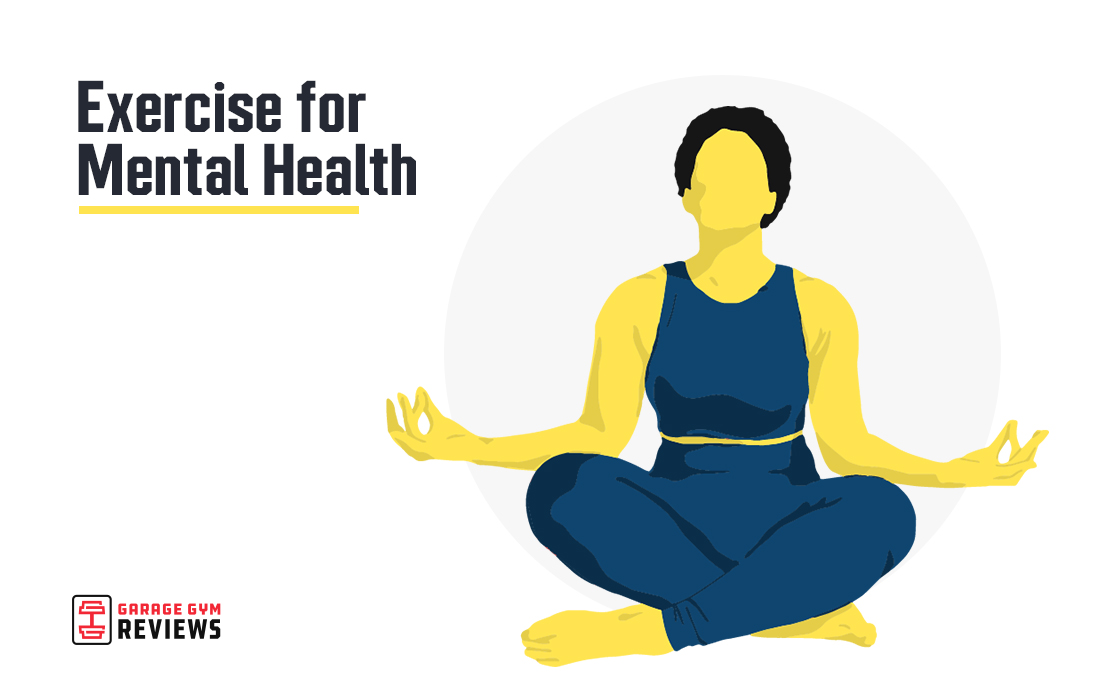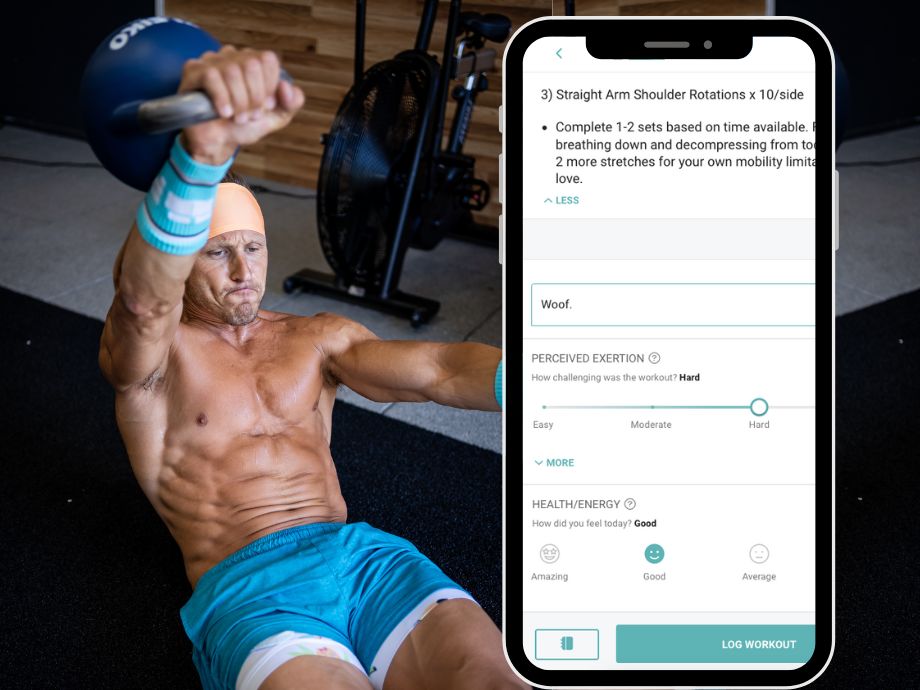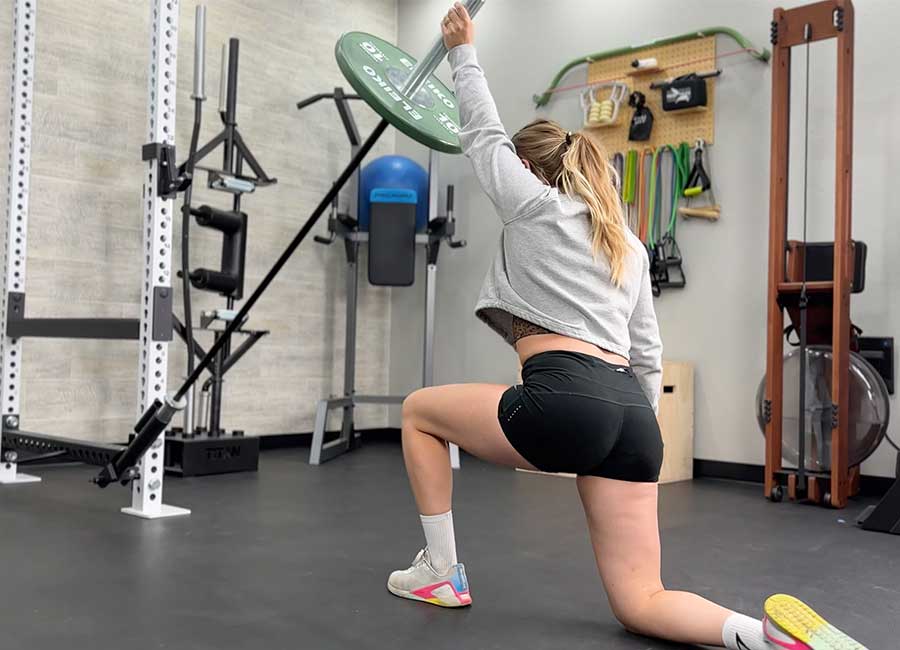Medically reviewed by Dr. Greg Carson, Licensed Psychologist and diplomate from the Academy of Cognitive Therapy.
When people talk about exercise and mental health, they’re often referring to how it can improve one’s physical health. But at the same time, routine strength training and cardio workouts can also have a positive impact on our mental health, which is just as, if not more important, than our physical well-being.
In fact, some studies1 suggest that exercise of any kind, be that weightlifting or riding a bike2, may enhance mental health and well-being and be just as effective at alleviating symptoms of stress and depression as therapeutic interventions such as expressive writing.
Considering that one-in-five adults3 are suffering from some form of mental illness, we wanted to compile a list of the benefits exercise has on mental health, give you tips on how to start and maintain a routine and hear from the experts on how your daily workout can help fight certain mental illnesses.
Key Takeaways
- 23% of adults1 in the US live with a mental illness.
- Studies have proven regular exercise to be effective in reducing symptoms of anxiety3 and depression.
- Self-esteem has been shown to increase significantly4 through the introduction of aerobic exercise.
- Young adults who exercised showed increased levels of self-efficacy5, self-esteem, and body awareness compared to sedentary young adults.
What are the Mental Health Benefits of Exercise?
Higher Confidence And Self Esteem
“[Exercise] increases the body’s overall feeling of energy and resilience, improves sleep quality, and builds confidence in our abilities,” Nassour says.
Better Memory And Cognition
“Your mood, memory, and concentration can be boosted by exercise through the release of feel-good endorphins, promotion of new brain growth, and strengthening of the hippocampus, the part of your brain involved in memory and learning,” says Mayra Diaz, a therapist who specializes in treating people with anxiety and obsessive-compulsive disorder.
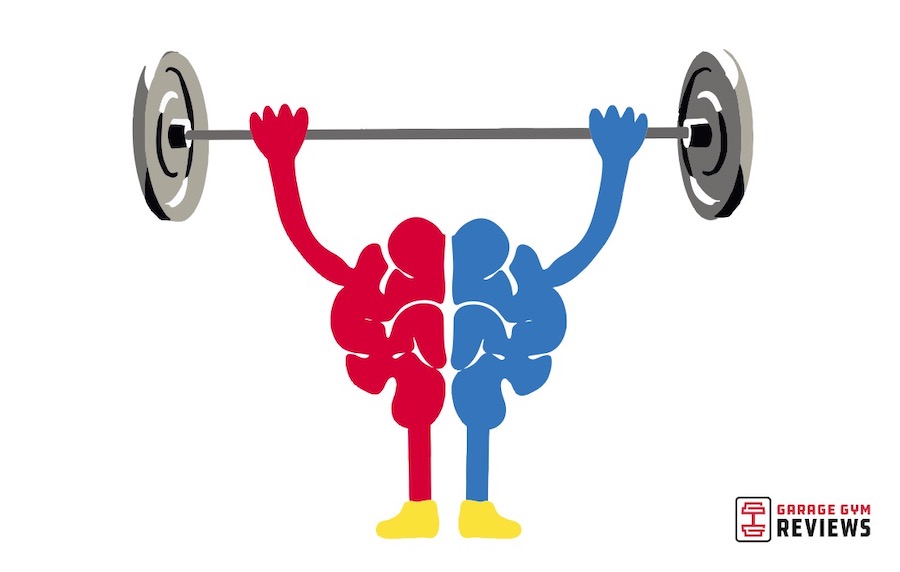
Improved Sleep
A review of dozens of studies6 on exercise’s impacts on sleep found that it improved both how well people slept, along with increased the amount of time they were able to sleep, especially in middle-aged and older adults. “The mental health experts we spoke to said this was due to the fact that physical activity and the benefits of exercise for older adults reduces people’s stress, which helps them fall asleep easier.”
Better Mood
Erika Vivyan, a licensed psychologist, pointed out that regular exercise promotes the release of dopamine and serotonin, “which help us to better manage our stress and anxiety responses.”
Higher Energy Levels
Exercise can make us feel more energized because it actually causes your body to produce more energy-supplying cells and increases our energy circulation, according to doctors at Harvard Medical School.
Healthier Coping Mechanisms
“Twenty minutes of aerobic exercise has been shown to lower the activation of your nervous system and amygdala,” Mayra says, referring to the part of the brain responsible for processing emotions. “This can lower your general levels of anxiety at rest, which can help you better cope and rebound from stressors.”
How Does Exercise Improve Self-Esteem?
In addition to improving your physical health, exercise can have powerful benefits on how you see yourself in the world.
Exercise and Self-Esteem
Self-esteem refers to how you see yourself and how you feel about your own skills, values, and worth.
People with positive self-esteem tend to feel better about themselves overall, which can promote happiness daily. A 2016 study found5 that eight weeks of aerobic exercise significantly improved self-esteem in medical students, even for those who didn’t previously have much self-esteem at all.
Higher Confidence
Having higher confidence can benefit people in all walks of life. Whether you want to be more outspoken in social gatherings, have more confidence at work, or simply believe you can overcome the challenges you face in life, exercise can help.
By learning new skills, improving fitness levels, and improving your health, you’re proving to yourself that you’re capable of doing hard things and making powerful changes in your life, which can improve your confidence.
Body Awareness
Body awareness refers to how in-tune you are with what your body is feeling and experiencing in any given moment. It’s knowing where your body is in space, being aware of subtle changes, and listening to the signals your body is sending you.
Many of us, especially when busy and stressed, tend to ignore the signs our bodies are sending. Exercise has been shown to improve body awareness4, forcing us to be more aware of what’s happening in our bodies. Whether that’s controlling your limbs during a complex exercise, understanding what stress and anxiety feel like, or listening to your body when you need to take a rest day, body awareness plays a large role in our mental health.
How Does Exercise Affect Mental Health?
Exercise can have positive impacts on your overall mental health, but it can also help alleviate or reduce the severity of certain conditions. Turner explains how physical activity can help those with anxiety, depression, and post-traumatic stress disorder.
Exercise & Anxiety
“Exercise can help reduce anxiety in a number of ways,” Turner says. “When you exercise, your brain’s opioid and cannabinoid receptors are activated which causes your body to experience short-term anxiety relief. Over time, exercise also helps to regulate your body’s production of the stress hormone cortisol. With normalized levels of cortisol, you’re better able to handle the worries life throws at you, decreasing your overall anxiety.”
Exercise & Depression
“If you’ve been in the exercise world for any length of time, you’ve undoubtedly heard about the ‘runner’s high,’ says Turner. “With moderate to intense exercise, your body releases more endorphins than it does when you’re sedentary. These feel-good endorphins, such as dopamine, are like rewards for your body’s hard work and often result in you feeling happier than before your workout.”
Exercise & PTSD
“Because PTSD symptoms overlap with symptoms of both anxiety and depression, people suffering with PTSD reap the benefits already mentioned,” Turner says. “In addition to those, exercise can also serve to reduce the hyperarousal, or feeling of always being on alert, that’s present with PTSD. Exercise, particularly cardio but anything that gets your heart racing or stresses your body, can over time help your body to realize that an increased heart rate or the feeling of running does not necessarily indicate danger. Over time, your brain and body habituate to those uncomfortable physiological responses and learn that you can tolerate those feelings without having to be on high alert.”
Exercise & ADHD
Physical activity can cause the release of dopamine, norepinephrine, and serotonin levels, which can help improve mood, focus, and attention. If you’re having a hard time staying focused, try a quick workout to boost your neurotransmitters and see if it helps you.
Exercise & Dementia
Regular exercise has also been shown to improve neurological health, not just our mood.
A 2021 study8 found that light to moderate physical activity can lower the risk of dementia and Alzheimer’s disease. The authors suggest that regular exercise for 6-8 weeks lowers the risk of developing dementia, making physical activity a powerful habit to maintain optimal cognitive function.
Exercise & Addiction
Finally, exercise may help play a role in those struggling with addiction. Specifically, physical activity has been shown9 to be effective in helping those fighting alcohol use disorder, though it may be able to help with other addictions as well.
Exercise can also help manage cravings for various substances when other forms of therapy aren’t available.
How Much Exercise Do I Need?
Exercise can seem overwhelming, but rest assured, it doesn’t need to take over your life for you to reap the benefits.
According to the CDC, adults need at least 150 minutes of moderate-intensity physical activity a week. However, you can spread this out over the week however you see fit. For example, doing 30 minutes a day, 5 days a week, would meet the CDC recommendations.
The CDC also recommends 2 days of muscle-strengthening activity per week, but this can be included in the 150 minutes of weekly activity as long as you’re doing your strength training at a moderate intensity.
Overcoming Obstacles to Exercising
Starting a physical exercise routine can be challenging for anybody, but it’s especially hard for those experiencing symptoms of mental illness.

“In fact, depressed individuals sometimes have a hard time getting out of bed, so you can only imagine how challenging it can be to move their bodies,” says Michael Vallejo, a licensed clinical social worker.
Colleen Wenner, a licensed mental health counselor, adds that some people may experience even more negative emotions if they find it difficult to start a routine.
“They often believe they’ve lost the battle even before they start. This preconceived mindset makes people excuse themselves from working out and avoid starting their workouts.”
Colleen Wenner
Other barriers and obstacles to exercise may include:
- Lack of motivation
- Lack of access to a gym or equipment
- Lack of time
- Lack of a support system
- Physical issues
Colleen also adds that those with self-image issues may have a harder time getting started than most. “If someone has low self-esteem, then they may avoid working out because they don’t like how they look,” she says. “If someone doesn’t like themselves, then they won’t like what their reflection looks like. A mental health specialist’s role then would be to help individuals overcome these obstacles so they can achieve their goals.”
However, most mental health professionals agree that once people get into a routine it becomes a part of their everyday life. “Once they’re able to get moving, they often find it easier to keep exercising after that,” says Meagan Turner, a licensed associate professional counselor. “It’s important to encourage people to find something they enjoy doing before going down the rabbit hole of finding the ‘perfect’ HIIT regimen, or any other regimen, for themselves.”
How Do I Start Exercising?
If you’re finding it hard to set an exercise routine for yourself, here are some helpful tips.
Find Activities You Enjoy
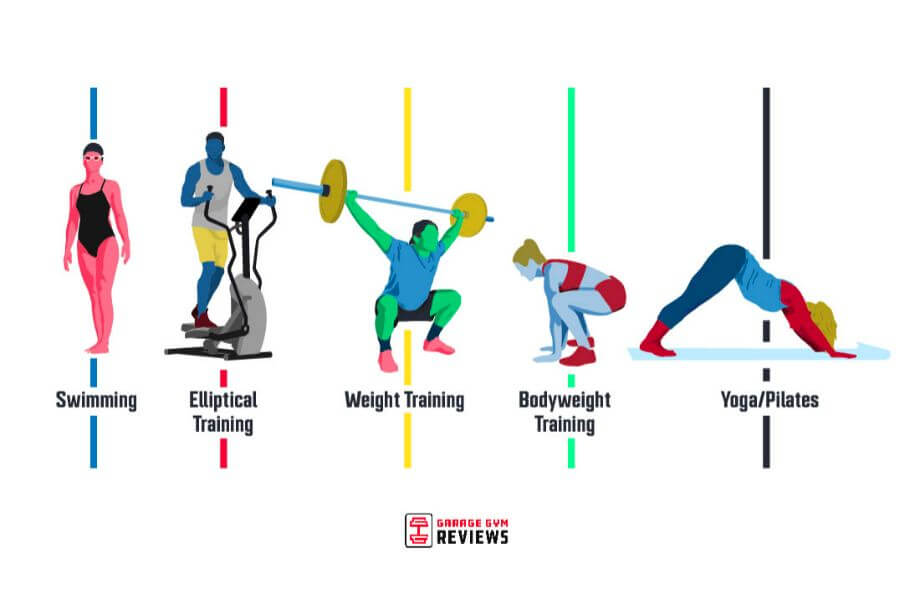
“You don’t have to go all-in on fitness,” Nassour says. “Even small amounts of exercise are still beneficial. If you can’t run, go for a walk; if you don’t like working out, try dancing or playing games instead. Start small and simple, and look for ways to make it fun.”
Make Working Out as Convenient as Possible
As a certified personal trainer, I often get asked when the best time to workout is, and the answer is, “Whenever you have time.” Have 10 minutes before a work call? Do some push-ups or pick up a set of dumbbells and try some bicep curls. Have an appointment on the third floor? Take the stairs instead of the elevator.
Splitting up your physical activity into little chunks throughout the day can be just as beneficial as doing it in one shot.
Create a Healthy Habit and Reinforce It
Whether it’s going for a morning walk, doing yoga, or a light jog on your treadmill, find a healthy habit that works for you. Then find ways to stick with it (for example, you can only watch Netflix while on the treadmill). You can reinforce it by delaying looking at social media or something else that’s purely pleasure until after you’ve completed your exercise for the day.
Find an Accountability Partner
“If you’re struggling to keep yourself accountable, join a group or ask a friend to be your accountability buddy,” Mayra says. “Exercising in group settings can also improve your mental health by increasing your sense of connection with others.”
Keep Tabs on Small Wins and Reward Yourself
Every time you reach a goal, treat yourself to a little something such as your favorite dessert.
Practice Breathing Techniques or Yoga
“When you do different exercises and yoga, you are bringing your mind into the present moment by connecting your mind and your body together,” says Katie Ziskind, a licensed marriage and family therapist who specializes in holistic treatment. “If you find that you have high anxiety, exercising and doing yoga can teach you how to deepen your breath and lower your heart rate. It’s a better way to handle stress.”
Exercise Outdoors
You probably know that the sun is our body’s main source of Vitamin D, but did you know that nutrient is directly tied to our moods? Studies7 have shown that people with lower Vitamin D levels often have a higher risk of depression or bad moods. So take your workouts outside.
Exercise And Mental Health: Our Takeaways
There have been great strides in removing the stigma around mental health conversations, but that doesn’t mean the job is finished. As people who have dedicated themselves to helping people improve their health, we have to recognize that means their mental well-being as well.
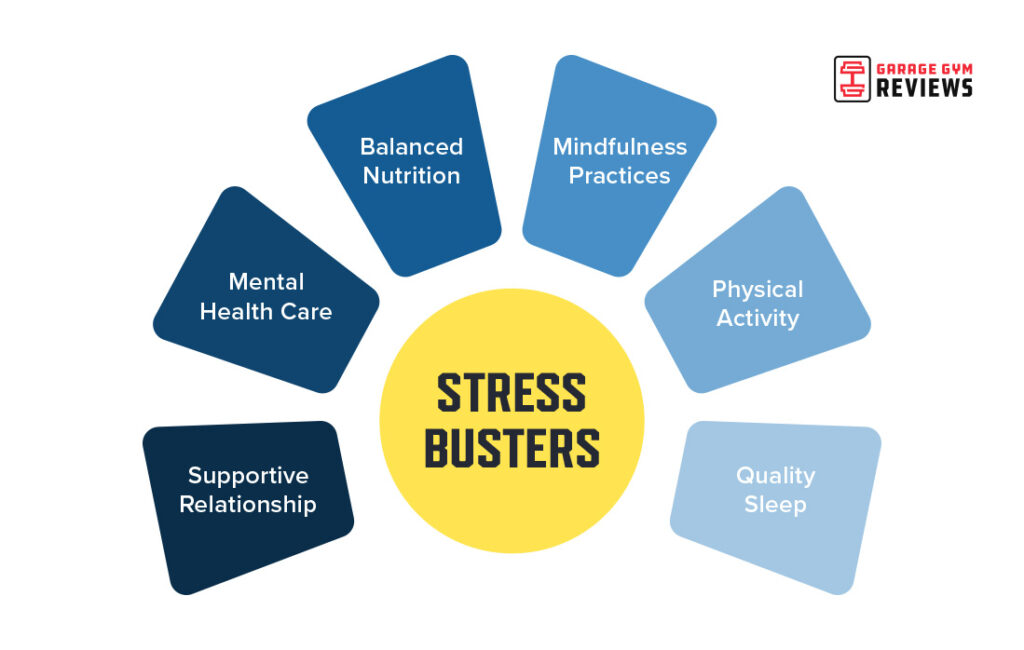
“Exercise helps mental health broadly across domains,” Turner says. “It has been shown to decrease fatigue associated with depression, stimulate neurotransmitters partly responsible for low mood, and improve executive functioning skills.”
“Exercising benefits one’s entire being—physically and mentally, emotionally, and even spiritually,” Wenner says. “For example, physical activity improves memory, concentration, and attention span.”
If you or any other person has a medical concern, you should consult with your health care provider or seek other professional medical treatment immediately. Visit the National Institute of Mental Health to find out how to get help.
Exercise And Mental Health FAQs
How does exercise affect mental health?
“Exercise almost always has a beneficial effect on mental health because your body tends to release endorphins when you are engaged in physical, and even strenuous, activities,” says licensed clinical social worker and water sports instructor Dmitri Oster. “Endorphins are essentially ‘feel-good’ hormones the human body releases when engaged in various pleasurable activities, and exercise is certainly one of them.”
How does exercise impact the brain?
“Exercise influences the brain’s development and function, leading to better memory and learning,” Weiss says. “As a result, regular physical activity lowers the risk of developing cognitive impairment, such as dementia, including Alzheimer’s disease. In addition, exercise has been found to improve mental health by reducing anxiety, depression, and negative mood, and improving self-esteem and cognitive function.”
What are some of the best exercises or activities for mental health?
“The best exercise is one that you can stick to. Try many different ones, looking for something that’s satisfying, accessible, and fits into your lifestyle. This could be anything from ping-pong to marathons,” Nassour says.
Is exercise as effective as antidepressants?
While exercise can have a powerful impact on mental health, you should never try to replace or stop using antidepressants without consulting with a medical professional.
How long does it take for exercise to improve mood?
While some studies show positive changes after eight weeks, a single workout can release endorphins, which are neurotransmitters that can have an immediate impact on mood and well-being.
Mental Health Professionals You Can Reach Out To For Assistance
| Psychiatrists | Licensed medical doctors trained to diagnose and treat mental disorders and prescribe medications for patients. |
| Psychotherapists | A general term for people who treat mental disorders using psychotherapy. The term is most often used by people with a master’s degree in the mental health field. Look for one that is licensed such as a Licensed Professional Counselor, Licensed Marriage and Family Therapy, or Licensed Clinical Social Worker. |
| Psychologists | Licensed psychologists hold a doctoral degree in psychology (Ph.D., PsyD, or EdD) and are trained to diagnose, evaluate and administer testing, and provide psychotherapy and other behavioral treatments. |
| Counselors | Counselor is a generic term for anyone who talks with another person about an issue and assists them in reaching a goal. It is most often used by people who do not have a mental health license but who do mental health treatments such as employees at an addiction treatment center, but it is sometimes used to refer to attorneys-at-law. |
| Peer specialists | A trained and sometimes supervised advocate who has experienced the same mental health conditions as those with whom they are working. They do not have formal mental health education and are not licensed. |
References
- Mental illness. (n.d.). National Institute of Mental Health (NIMH). https://www.nimh.nih.gov/health/statistics/mental-illness#:~:text=Mental%20illnesses%20are%20common%20in,(52.9%20million%20in%202020).
- Leyland, L. A., Spencer, B., Beale, N., Jones, T., & van Reekum, C. M. (2019). The effect of cycling on cognitive function and well-being in older adults. PloS one, 14(2), e0211779. https://doi.org/10.1371/journal.pone.0211779
- Herbert, C., Meixner, F., Wiebking, C., & Gilg, V. (2020). Regular Physical Activity, Short-Term Exercise, Mental Health, and Well-Being among University Students: the results of an online and a laboratory study. Frontiers in Psychology, 11. https://doi.org/10.3389/fpsyg.2020.00509
- Gilani, S. R. M., & Dashipour, A. (2016). The Effects of Physical activity on Self-Esteem: A Comparative study. International Journal High Risk Behaviors & Addiction, 6(1). https://doi.org/10.5812/ijhrba.35955
- Tikac, G., Unal, A., & Altug, F. (2022). Regular exercise improves the levels of self-efficacy, self-esteem and body awareness of young adults. The Journal of sports medicine and physical fitness, 62(1), 157–161. https://doi.org/10.23736/S0022-4707.21.12143-7
- Dolezal, B. A., Neufeld, E. V., Boland, D. M., Martin, J. L., & Cooper, C. B. (2017). Interrelationship between Sleep and Exercise: A Systematic Review. Advances in preventive medicine, 2017, 1364387. https://doi.org/10.1155/2017/1364387
- Menon, V., Kar, S. K., Suthar, N., & Nebhinani, N. (2020). Vitamin D and Depression: A Critical Appraisal of the Evidence and Future Directions. Indian journal of psychological medicine, 42(1), 11–21. https://doi.org/10.4103/IJPSYM.IJPSYM_160_19
- Wang, S., Liu, H. Y., Cheng, Y. C., & Su, C. H. (2021). Exercise Dosage in Reducing the Risk of Dementia Development: Mode, Duration, and Intensity-A Narrative Review. International journal of environmental research and public health, 18(24), 13331. https://doi.org/10.3390/ijerph182413331
- Mahindru, A., Patil, P., & Agrawal, V. (2023). Role of Physical Activity on Mental Health and Well-Being: A Review. Cureus, 15(1), e33475. https://doi.org/10.7759/cureus.33475


